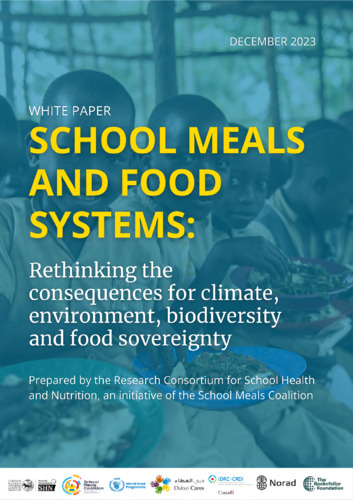School meals and food systems: Rethinking the consequences for climate, environment, biodiversity, and food sovereignty
There is an urgent need to rethink our global food systems. The world is facing a nutrition crisis, and the way we produce and consume food is altering the equilibrium of our planet, causing environmental damage and biodiversity loss, and climate change which further compromises food security. Children are disproportionately affected, and school meals are being increasingly recognized as a key investment for governments to tackle these challenges. Through national school meals programs, around 418 million children currently receive a meal at school every day. This provides an exceptional opportunity for the implementation planet-friendly policies which have enormous co-benefits for child health and the wider society. To explore these opportunities, this White Paper was prepared by The Research Consortium for School Health and Nutrition, an initiative of The School Meals Coalition (SMC), a multilateral coalition of 95+ countries aiming to improve and expand national school meal programs for all children. The White Paper, written in collaboration with 85 organizations worldwide, explains how implementing planet-friendly school meal programs can provide far reaching co-benefits for public health and human capital. The paper proposes that to maximize the transformative potential of school meal programs, governments should focus on two sets of policies. First, those that can create immediate benefits for children and the planet, including: adopting nutritious, diverse, whole foods menus; switching to clean, efficient and sustainable energy for cooking; minimizing food and package waste; and empowering children by establishing life-long healthy and sustainable food habits through holistic food education. Secondly, leveraging the power of procurement, governments can create demand-driven changes to support sustainable ecological and regenerative agriculture practices, which promote biodiversity, resilience, and food sovereignty.

